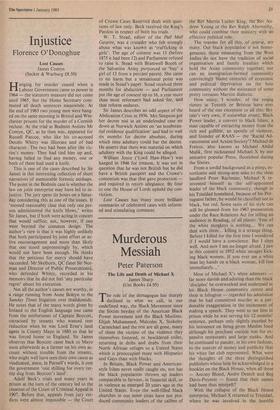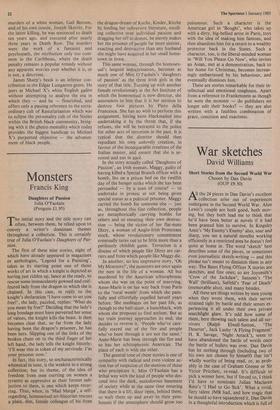Murderous Messiah
Peter Paterson
The Life and Death of Michael X James Sharp (Uni Books £4.95)
The role \A the demagogue has sharply declined in what we call, in our undefined way, the Black Movement since the Sixties heyday of the American Black Power movement and the Black Muslims. Elijah Muhammed, Malcolm X, Stokeley Carmichael and the rest are all gone, many of them the victims of the violence they themselves fostered, or bewildered exiles, returning in dribs and drabs from their North African refuges to a United States which is preoccupied more with Hispanics and Gays than with blacks.
In Britain, Black Power and American- style Islam never really caught on, nor has the black population thrown up leaders comparable in fervour, in financial skill, or in violence as emerged 20 years ago in the United States. Even the well-filled black churches in our inner cities have not pro- duced community leaders of the calibre of
the Rev Martin Luther King, the-Rev An- drew Young or the Rev Ralph Abernathy, who could combine their ministry with an effective political role.
The reasons for all this, of course, are many. Our black population is not homo- geneous: those emanating from the West Indies 'do not have the tradition of social organisation and family loyalties which hold the Asian community together; nor can an immigration-formed community convincingly blame centuries of economic and political deprivation on the host community without the assistance of some pretty tortuous Marxist dialectic.
How many, I wonder, of the young rioters in Toxteth or Brixton have ever heard of the one exception to all this: Bri- tain's very own, if somewhat ersatz, Black Power leader, a convert to black Islam, a man capable of extracting money from the rich and gullible, an apostle of violence, and founder of RAAS — the 'Racial Ad- vancement and Action Society'? Michael de Freitus, also known as Michael Abdul Malik, first nicknamed Michael X by our imitative popular Press, flourished during the Sixties.
From a sordid background as a pimp, ex- tortionist and strong-arm man to the slum landlord Peter Rachman, Michael X re- invented himself as the self-appointed leader of the black community, though in his Trinidad homeland, because of his Por- tuguese father,.he would be classified not as black, but red. Some taste of his style can still be gleaned from his 1967 prosecution under the Race Relations Act for telling an audience in Reading, of all places: 'Fear of the white monkeys is nothing... We can deal with them... killing is a strange thing. Before I killed for the first time I wondered if I would have a conscience. But I slept well. And now I am no longer afraid. I saw in this country in 1952 white savages kick- ing black women. If you ever see a white man lay hands on a black woman, kill him immediately...'
Most of Michael X's white admirers --- far more slavish and adoring than the black `disciples' he overworked and underpaid in his Black House community centre and shop in Islington — regarded his admission that he had committed murder as a par- donable exaggeration in the excitement of making a speech. They went to see him in prison while he was serving his 12 months' sentence, perhaps only slightly puzzled by his insistence on being given Muslim food although his penchant outside was for ex- pensive restaurants and large steaks. And he continued to pander, in his own fashion, to the sources of money and publicity that his white fan club represented. What were the thoughts of the three distinguished publishers whose help he acknowledged in a booklet on the Black House, when all three — Antony Blond, Andre Deutch and Reg Davis-Poynter — found that their names had been thus misspelt?
With the collapse of the Black House enterprise, Michael X returned to Trinidad, where he was involved in the horrific murders of a white woman, Gail Benson, and of his own cousin, Joseph Skerritt. For the latter killing, he was sentenced to death ten years ago, and executed after nearly three years in Death Row. The murders were the work of a fantasist and psychopath, the retribution only too com- mon in the Caribbean, where the death penalty remains a popular remedy without any apparent worries over whether it is, or is not, a deterrent.
James Sharp's book is an inferior con- tribution to the Edgar Lustgarten genre. He jeers at Michael X's white English galere without attempting to analyse the era in which they — and he — flourished, and offers only a passing reference to the extra- ordinary cult of Rastafarianism which was to eclipse the personality cult of the Sixties within the British black community, bring- ing with it the ghetto mentality which today provides the biggest handicap to Michael X's purported objective — the advance- ment of black people.



































 Previous page
Previous page